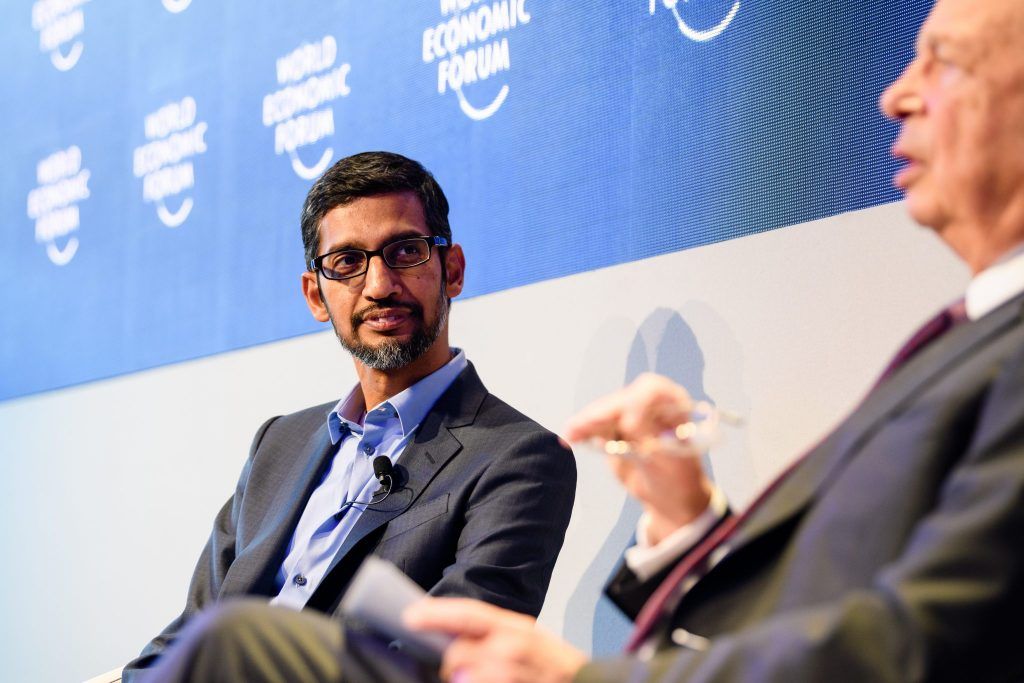Google’s day of reckoning
By Matt Field | December 11, 2018
 Google CEO Sundar Pichai. Credit: © World Economic Forum / Manuel Lopez CC BY-NC-SA 2.0
Google CEO Sundar Pichai. Credit: © World Economic Forum / Manuel Lopez CC BY-NC-SA 2.0
Compared to other Silicon Valley titans, Google has long appeared to be a bit player in the controversies over misinformation, hate speech, and user privacy that have plagued the likes of Facebook and Twitter, especially in the wake of the 2016 US presidential election. That may change Tuesday as Google CEO Sundar Pichai takes part in a sort of makeup session with the US Congress. (Unlike Twitter and Facebook, Google didn’t send a high-level representative to a US Senate hearing in September.)
Lately, Google’s troubles seem to be piling up. The company has had to backtrack on issues such as its treatment of executives accused of sexual misconduct and its pursuit of a US Department of Defense contract for artificial intelligence technology. Needless to say, Pichai will have plenty to talk about.
Project Dragonfly. Pichai told a Wired event in October that Google had developed a test-version of a censored search engine for China, a move representing a potential return to the country after the company pulled the plug on its search engine operation there in 2010.
“It turns out we’ll be able to serve well over 99 percent of the queries,” Pichai said, claiming the search engine, known as Project Dragonfly, would give Chinese users access to quality information on cancer treatments, for instance.
But hundreds of Google employees have signed onto a letter demanding their employer end the project. They cite China’s human rights record and efforts to develop a sophisticated mass surveillance program. “Our company’s decision comes as the Chinese government is openly expanding its surveillance powers and tools of population control,” the employees wrote in a Medium post. “Many of these rely on advanced technologies, and combine online activity, personal records, and mass monitoring to track and profile citizens. Reports are already showing who bears the cost, including Uyghurs, women’s rights advocates, and students.”
US officials, including Vice President Mike Pence, have also weighed in against Project Dragonfly. House Majority Leader Kevin McCarthy, a California Republican, suggested the company is “compromising its core principles by complying with repressive censorship mandates from China.”
Google ended its experiment with search in China in 2010 after a hack that targeted the Gmail accounts of Chinese human rights activists. A company spokesperson wrote at the time: “We also made clear that these attacks and the surveillance they uncovered—combined with attempts over the last year to further limit free speech on the web in China including the persistent blocking of websites such as Facebook, Twitter, YouTube, Google Docs, and Blogger—had led us to conclude that we could no longer continue censoring our results on Google.cn.”
Conservative anger. One of the ostensible reasons Pichai was invited to testify to Congress was Google’s alleged algorithmic bias against conservatives. President Donald Trump stoked this anger when he posted on Twitter in August that Google results for “Trump News” only contained the reporting of the “Fake News Media.”
“Fake CNN is prominent. Republican/Conservative & Fair Media is shut out. Illegal?” Trump asked.
Trump was echoing a fairly common belief by conservatives that social media companies censor political views.
The conservative website Breitbart then obtained video in September of a Google meeting held after Trump’s electoral victory in which the company’s leadership expressed disappointment in the election results. One of the founders, Sergey Brin, said he found the election “deeply offensive.”
#MeToo. The New York Times broke the story in October that Google conducted an internal investigation into the creator of its Android software, Andy Rubin, and concluded he had coerced an employee into an unwanted sexual encounter. Instead of firing Rubin, Google paid him $90 million and praised him as he left the company. The Times wrote Rubin was one of three executives the company “protected after they were accused of sexual misconduct.”
Thousands of Google employees walked out of their offices in cities around the world in November in the wake of the Times report. Google co-founder Larry Page apologized for sexual harassment at Google, and the company revealed that 48 people had been fired for sexual harassment and didn’t receive exit packages.
Project Maven. Thousands of employees backed a letter to Pichai demanding an end to Google’s effort to help the US Defense Department use artificial intelligence to analyze drone footage. Some in the company viewed the program, dubbed Project Maven, as a precursor to more lucrative opportunities with the Pentagon in the future. But the idea of applying artificial intelligence technology to drone data proved a step too far for many employees.
Employees asked that Pichai abandon the project, writing: “The argument that other firms, like Microsoft and Amazon, are also participating doesn’t make this any less risky for Google. Google’s unique history, its motto Don’t be Evil, and its direct reach into the lives of billions of users set it apart.”
Shortly after the decision not to renew the Project Maven contract was reported in June, Pichai wrote in a blog post that Google would not produce AI-based weapons.
Uncompetitive practices. Google’s troubles haven’t ended at water’s edge. The European Commission has slapped the company with aggressive fines for promoting its own search engine on Android phones and promoting its own services in searches. Most recently, Google was fined $5.1 billion in July over its alleged unfair practices related to Android phones.
The Times notes that Europe has taken an aggressive approach to regulating tech companies, in contrast to the United States: “The severity of the decision against Google was in keeping with Europe’s aggressive curtailment of American tech companies in areas including privacy, antitrust and taxes.”
Publication Name: Wired
To read what we're reading, click here
Together, we make the world safer.
The Bulletin elevates expert voices above the noise. But as an independent nonprofit organization, our operations depend on the support of readers like you. Help us continue to deliver quality journalism that holds leaders accountable. Your support of our work at any level is important. In return, we promise our coverage will be understandable, influential, vigilant, solution-oriented, and fair-minded. Together we can make a difference.
















I guess this means that when we research on Google for information, guess we have to dug deeper to know the real truth/facts